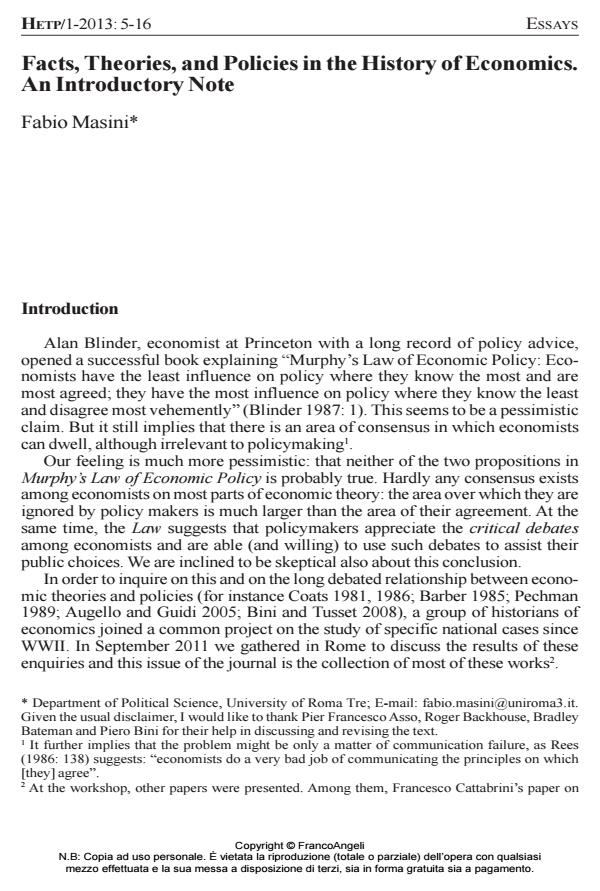Facts, Theories, and Policies in the History of Economics. An Introductory Note
Journal title HISTORY OF ECONOMIC THOUGHT AND POLICY
Author/s Fabio Masini
Publishing Year 2013 Issue 2013/1
Language English Pages 12 P. 5-16 File size 82 KB
DOI 10.3280/SPE2013-001001
DOI is like a bar code for intellectual property: to have more infomation
click here

FrancoAngeli is member of Publishers International Linking Association, Inc (PILA), a not-for-profit association which run the CrossRef service enabling links to and from online scholarly content.
Facts, theories, and policies can be considered as the vertices of a triangle. While many contributions explore along the edges of such triangle, between couples of poles, we claim that the history of economics thought is fundamentally interested in looking within the whole area of the triangle. The relationship among theories, public choices, and events is complex, often twodirectional, with some unforeseeable short circuits. In order to tackle such complexity, it is necessary to use an interpretative model that assumes a high degree of interdependence between such variables and focuses on the evolution of their mutual interactions over time. The paper aims to show that this is the approach that the works presented in this issue of the journal try to address and illustrates some of their key features, in particular country-specificity and ideological bias.
Keywords: History of economic thought, ideologies, country-specificity
Jel codes: A12, B10, B41
- A history of the theories on Optimum Currency Areas Fabio Masini, in The European Journal of the History of Economic Thought /2014 pp.1015
DOI: 10.1080/09672567.2014.966130 - European Economic Governance Fabio Masini, pp.1 (ISBN:978-3-031-13093-9)
- Balance of Payment, Wage Indexation and Growth: the Role of CESPE in Italian Policy-Making in the 1970s Francesco Cattabrini, Fabio Masini, in HISTORY OF ECONOMIC THOUGHT AND POLICY 2/2017 pp.25
DOI: 10.3280/SPE2017-002002 - An intellectual boost for Italy’s Europeanisation: the contribution of the influential think tanks Arel and Nomisma (1978–1993) Luca Sandonà, in The European Journal of the History of Economic Thought /2021 pp.324
DOI: 10.1080/09672567.2020.1817118
Fabio Masini, Facts, Theories, and Policies in the History of Economics. An Introductory Note in "HISTORY OF ECONOMIC THOUGHT AND POLICY" 1/2013, pp 5-16, DOI: 10.3280/SPE2013-001001